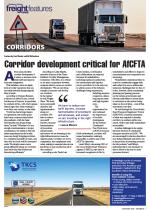Af rica needs to unify its efforts and commit to equally developing its routes, while harmonising the regulations and procedures along these corridors, especially if it wants to improve economic performance and reap the full potential of the African Continental Free Trade Area (AfCFTA).This, however, has been one of the greatest challenges, not only in the region, but across Africa, says Mbahupu H Tjivikua, chief executive officer, Walvis Bay Corridor Group (WBCG).“More efficient and well-maintained corridors equate to reduced costs, which lead to increased cargo and the opportunity to provide more value-added services,” says Tjivikua. “2021 started off on a good footing with the commencement of the AfCFTA agreement, which presents a major opportunity for the continent to boost intra-African trade and economic diversification, accelerate growth and value chain development as well as improve Africa’s position in the global marketplace.”According to Tjivikua, investment in all the region’s transport corridors is crucial to ensure the efficient movement of goods. “Recent events on the corridors have shown us that it is imperative to have varied, regularly used routes to move the cargo in the region. This will ensure that the regional supply chain is not too severely impacted when there are stoppages on one of the region’s corridors.”He highlighted that the WBCG played a crucial role in improving trade facilitation measures in the region, supported the AfCFTA agreement’s efforts at reducing non-tariff barriers (NTBs) to trade, and strengthening intra-African trade.“This year marked WBCG’s transition into maturity, as a reputable corridor management institution, celebrating 21 years since the establishment of the company. WBCG has become one of the key facilitating bodies in the Namibian economy, driving the agenda of the transport and logistics sector,” he told Freight News. “The Walvis Bay Corridors are widely recognised to offer compelling value propositions, and demonstrated significant growth, not only in terms of volume, but also reduced transit times, removal of bottlenecks, and improved corridor logistics. To this end, we now cover the consumer market across the SADC region with our corridor net work.”He said Covid-19 had, however, resulted in unprecedented disruptions to the continent’s economy and corridors.“One of the major barriers encountered during the pandemic was the physical distancing measure which resulted in the reduction of workplace mobility, with companies forced to use skeleton staff or adopt a staff rotation system, which led to various delays, for example fewer customs officials on site, thus causing bottlenecks in the movement of cargo. However, this has compelled the industry to embrace digital technology and maximise its full potential.”One such digital solution currently being piloted is the Corridor Trip Monitoring System (CTMS) at borders on the Trans Kalahari Corridor and the Walvis Bay-Ndola-Lubumbashi Development Corridor (WBNLDC).“The CTMS seeks to facilitate the continuation of cross-border trade of goods and services during the ongoing crises occasioned by the coronavirus. The system will further facilitate and ensure that cross-border transport and transit is performed by healthy drivers who can be constantly monitored and tracked to reduce the spread of Covid-19. The implementation of the CTMS will also reduce extended travel and transit times during the pandemic,” explained Tjivikua.To address the ongoing Covid pandemic, the WBCG has added Covid-19 testing and vaccinations to its services at its roadside and wellness clinics to assist truckers to get vaccinated.“Our mobile clinics have also set up vaccination points for truckers at the weighbridges in Katima Mulilo and Windhoek, and recently started rolling out one-day drive-through vaccination points at identified truck stops along the corridors in Namibia.

